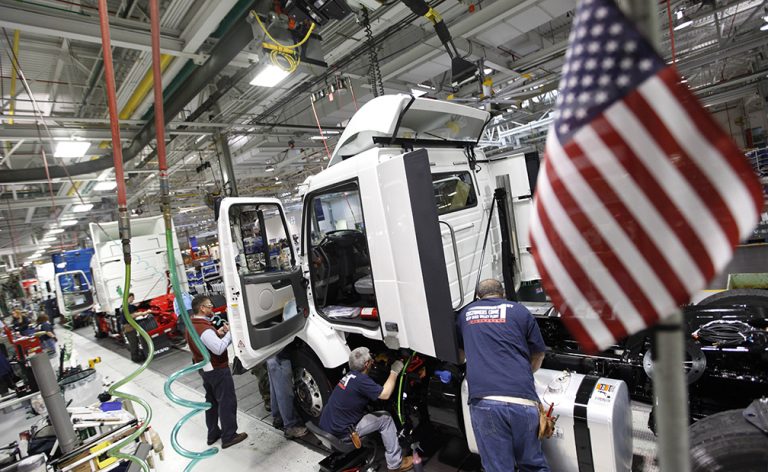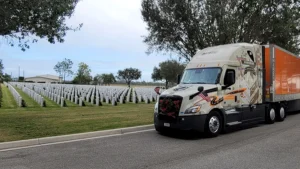NORFOLK, Va. — Volvo Trucks North America says some striking workers crossed picket lines Monday, July 12, at a southwestern Virginia factory as the company plans to restart production.
Spokesman John Mies wouldn’t say how many United Auto Workers (UAW) members went inside the factory in Dublin, Virginia, near Roanoke. But he says in an email that it will take a few days to get assembly lines back up and running at the plant, which employs 2,900 UAW workers.
Union members at the heavy truck assembly plant have voted down three tentative contract agreements reached with local union negotiators, with the most recent rejection coming on Friday, July 9. They initially went on strike in April.
UAW spokesman Brian Rothenberg said about 10 workers crossed the lines Monday morning, in addition to a “handful” of union workers who had gone to work earlier. He said he didn’t have exact numbers.
Both Volvo Trucks and Rothenberg say workers will vote again on the third agreement again on Wednesday. “Our final offer is on the table; it is the third tentative agreement,” Mies said in an email Monday.
Rothenberg said the union is researching legal options and may have an announcement later Monday. He did not know if the company had enough workers to produce any trucks. He said in any strike, a small number of workers cross picket lines.
On Friday, Volvo trucks said in a statement that it will implement terms and conditions of the third agreement, reached with local union leaders on July 1. Returning employees “will immediately receive the wage increases and benefits outlined in the July 1 agreement, except for the ratification bonuses that would be paid on contract ratification,” the company said.
The previous contract, reached in 2016, was to have expired in mid-March. Negotiations began in February. Workers went on strike from April 17 to 30 and returned to work as they were voting on the first agreement. But members rejected that offer in May.
The company announced another six-year tentative agreement later that month, but it was rejected June 6.
Mies said Monday the company is focused on employee training and equipment testing as it moves to restart assembly lines at the plant that makes semi tractors.
The recalcitrant strikers could be a sign that workers feel more emboldened because employers are having a hard time finding skilled workers.
“There’s less fear of never finding another job, and that does mean that the gamble for the membership is not as severe,” said Arthur Wheaton, a labor expert who teaches at Cornell University’s Worker Institute.
While workers may not find a job quite as good as the one they have at Volvo in southwestern Virginia, they could be thinking: “‘If they fire us or replace us, how many people have the skill set to build these heavy trucks? … There’s not a lot of us around. And we think you’re gonna have to pay us.’”
Volvo could take a risk by hiring permanent employees to replace striking workers because the new workers may not be at the same skill level, he said. “They aren’t just building a little tiny golf cart. These things are huge, and they have a lot of parts to them.”
Contract negotiations are usually over wages, health insurance and pensions, Wheaton said. But working conditions to prevent the spread of COVID could also be at play at the bargaining table.
Dublin is in Virginia’s Pulaski County, where 46.7% of the adult population is vaccinated, according to the Virginia Department of Health’s COVID dashboard.
The UAW has said previously that workers had concerns about health care, wages, health and safety issues, working conditions, plant shift operations, contractual time off and wage progression.
Volvo says the 1.6 million-square-foot (nearly 150,000-square-meter) Dublin plant is the largest manufacturer of Volvo trucks in the world. It is one of the largest private sector employers in the region, with approximately 3,300 employees, some 2,900 represented by the UAW.
“The ongoing strike — which we continue to believe is unnecessary — is hurting our customers, and has already set back our project to expand and upgrade the facility,” plant Vice President and General Manager Franky Marchand said in a statement last week. “No one is gaining from the current situation, and we will consider all options related to the bargaining process.”
The Volvo Group is the only heavy-duty truck manufacturing group that assembles all of its trucks and engines for the North American market in the U.S., according to Volvo. It said the plant is undergoing a $400 million investment for technology upgrades, site expansion and preparation for future products, including the Volvo VNR Electric truck.
It added the plant has added 1,100 jobs since the current union agreement was implemented in 2016 and is on track to have a net increase of approximately 600 positions in 2021.
By Ben Finley and Tom Krisher
The Associated Press is an independent global news organization dedicated to factual reporting. Founded in 1846, AP today remains the most trusted source of fast, accurate, unbiased news in all formats and the essential provider of the technology and services vital to the news business. The Trucker Media Group is subscriber of The Associated Press has been granted the license to use this content on TheTrucker.com and The Trucker newspaper in accordance with its Content License Agreement with The Associated Press.














